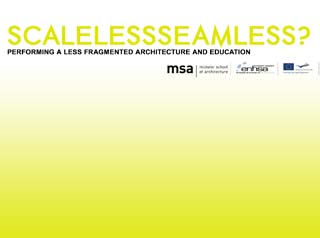INTERNATIONAL SYMPOSIUM ON INTEGRATED PLANNING PROCESSES
Scaleless Seamless 2012
Facilitated by the extended applications of digital technology in all sectors of production, administration, education and consumption, the contemporary world can be increasingly conceived as a global and systemic environment.
Architecture and the building process are reflecting this new conception of the world by redefining themselves according to new principles and means. The fast development of digital techniques to simulate, represent and generate Architecture promises a continuous design process, including the seamless transfer of information between the involved parties and making performance a key issue in the planning process. In this process, concepts of adaptability, transformability and flexibility are replacing already tested and secure solutions, customization is replacing standardization and metrics, and digital tools are replacing analogue representations.
In these new conditions the scaleless and the seamless appear as the two key pillars of the requested integration in contemporary architectural practice and education. Do the design and planning practices and construction industries respond with digital synergies to these new requests? Can the curricula of architecture schools escape from the dominance of traditional fragmentation within their structure and the organisation of the modules and academic units towards more holistic concepts and workflow? How can the traditionally separate courses offered by departments and modules of architectural education institutions be redefined in order to assure a scale-less and seamless thinking about form, materiality and its social and cultural representations, its environmental aspects and its urban and contextual references?
The msa | muenster school of architecture in collaboration with the European Network of Heads of Schools of Architecture (ENHSA) and the European Association for Architectural Education (EAAE) invite teachers, researchers and practitioners to discuss potentials for the development of more integrated formats of education and practice. The Conference wishes to give an overview of the practical implications of collaborative processes as well as contemporary research in this field. Additionally, the conference will present cases of architectural design, construction and fabrication where information processing with digital tools plays a crucial role in the design process at different scales.
KEYNOTE SPEAKERS:
Achim Menges
Institute for Computational Design, Stuttgart
Kas Oosterhuis
University of Technology, Delft
Philippe Morel
Ecole nationale supérieure d’architecture Paris-Malaquais, paris
Mette Ramsgard Thomsen
Royal Academy of Fine Arts, School of Architecture, Copenhagen
Ulrika Karlsson
KTH Stockholm
Marcus Fimpel
Dassault Systemes

